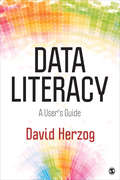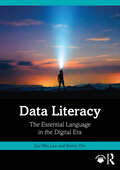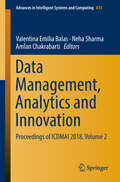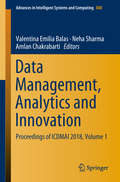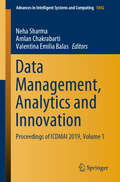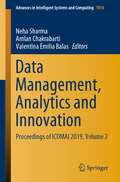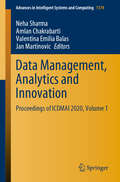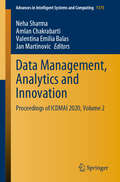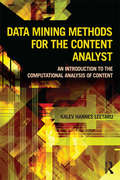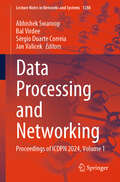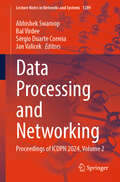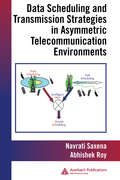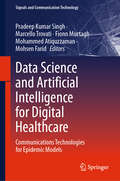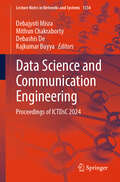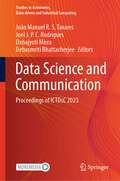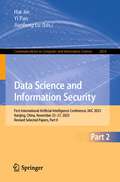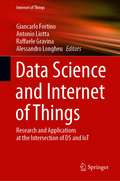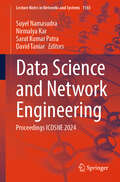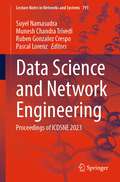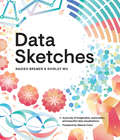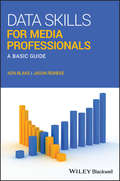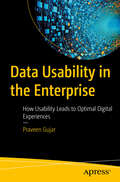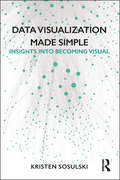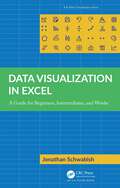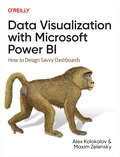- Table View
- List View
Data Literacy: A User′s Guide
by David L. HerzogA practical, skill-based introduction to data analysis and literacy We are swimming in a world of data, and this handy guide will keep you afloat while you learn to make sense of it all. In Data Literacy: A User′s Guide, David Herzog, a journalist with a decade of experience using data analysis to transform information into captivating storytelling, introduces students and professionals to the fundamentals of data literacy, a key skill in today’s world. Assuming the reader has no advanced knowledge of data analysis or statistics, this book shows how to create insight from publicly-available data through exercises using simple Excel functions. Extensively illustrated, step-by-step instructions within a concise, yet comprehensive, reference will help readers identify, obtain, evaluate, clean, analyze and visualize data. A concluding chapter introduces more sophisticated data analysis methods and tools including database managers such as Microsoft Access and MySQL and standalone statistical programs such as SPSS, SAS and R.
Data Literacy: The Essential Language in the Digital Era
by Sau Wai Law Benny YimData has been called the ‘new oil’ of the 21st-century economy, yet knowledge of how to harness and comprehend data is lagging. This book presents a comprehensive guide for university students and business practitioners to acquire the core competencies to become data literate.Data Literacy: The Essential Language in the Digital Era introduces a logical way to master the nature, features, characteristics, limitations, uses, and protection of data, as well as its legal, regulatory, and ethical concerns. The book helps readers to develop their data literacy skills, based on lessons learnt from the authors’ professional experience in the banking and education sectors, together with doctrinal and empirical findings from research and observation.With a structured methodology for interpreting data, practical case studies, and useful exercises, this textbook is an essential guide and reference for students, practitioners, and scholars in any discipline, as well as policymakers and regulators from all over the world.
Data Management, Analytics and Innovation: Proceedings Of Icdmai 2018, Volume 2 (Advances In Intelligent Systems and Computing #839)
by Valentina Emilia Balas Amlan Chakrabarti Neha SharmaThe volume on Data Management, Analytics and Innovations presents the latest high-quality technical contributions and research results in the areas of data management and smart computing, big data management, artificial intelligence and data analytics along with advances in network technologies. It deals with the state-of-the-art topics and provides challenges and solutions for future development. Original, unpublished research work highlighting specific research domains from all viewpoints are contributed from scientists throughout the globe. This volume is mainly designed for professional audience, composed of researchers and practitioners in academia and industry.
Data Management, Analytics and Innovation: Proceedings of ICDMAI 2018, Volume 1 (Advances in Intelligent Systems and Computing #808)
by Valentina Emilia Balas Amlan Chakrabarti Neha SharmaThe book presents the latest, high-quality, technical contributions and research findings in the areas of data management and smart computing, big data management, artificial intelligence and data analytics, along with advances in network technologies. It discusses state-of-the-art topics as well as the challenges and solutions for future development. It includes original and previously unpublished international research work highlighting research domains from different perspectives. This book is mainly intended for researchers and practitioners in academia and industry.
Data Management, Analytics and Innovation: Proceedings of ICDMAI 2019, Volume 1 (Advances in Intelligent Systems and Computing #1042)
by Valentina Emilia Balas Amlan Chakrabarti Neha SharmaThis book presents the latest findings in the areas of data management and smart computing, big data management, artificial intelligence and data analytics, along with advances in network technologies. It addresses state-of-the-art topics and discusses challenges and solutions for future development. Gathering original, unpublished contributions by scientists from around the globe, the book is mainly intended for a professional audience of researchers and practitioners in academia and industry.
Data Management, Analytics and Innovation: Proceedings of ICDMAI 2019, Volume 2 (Advances in Intelligent Systems and Computing #1016)
by Valentina Emilia Balas Amlan Chakrabarti Neha SharmaThis book presents the latest findings in the areas of data management and smart computing, big data management, artificial intelligence and data analytics, along with advances in network technologies. It addresses state-of-the-art topics and discusses challenges and solutions for future development. Gathering original, unpublished contributions by scientists from around the globe, the book is mainly intended for a professional audience of researchers and practitioners in academia and industry.
Data Management, Analytics and Innovation: Proceedings of ICDMAI 2020, Volume 1 (Advances in Intelligent Systems and Computing #1174)
by Valentina Emilia Balas Amlan Chakrabarti Neha Sharma Jan MartinovicThis book presents the latest findings in the areas of data management and smart computing, big data management, artificial intelligence and data analytics, along with advances in network technologies. Gathering peer-reviewed research papers presented at the Fourth International Conference on Data Management, Analytics and Innovation (ICDMAI 2020), held on 17–19 January 2020 at the United Services Institute (USI), New Delhi, India, it addresses cutting-edge topics and discusses challenges and solutions for future development. Featuring original, unpublished contributions by respected experts from around the globe, the book is mainly intended for a professional audience of researchers and practitioners in academia and industry.
Data Management, Analytics and Innovation: Proceedings of ICDMAI 2020, Volume 2 (Advances in Intelligent Systems and Computing #1175)
by Valentina Emilia Balas Amlan Chakrabarti Neha Sharma Jan MartinovicThis book presents the latest findings in the areas of data management and smart computing, big data management, artificial intelligence and data analytics, along with advances in network technologies. Gathering peer-reviewed research papers presented at the Fourth International Conference on Data Management, Analytics and Innovation (ICDMAI 2020), held on 17–19 January 2020 at the United Services Institute (USI), New Delhi, India, it addresses cutting-edge topics and discusses challenges and solutions for future development. Featuring original, unpublished contributions by respected experts from around the globe, the book is mainly intended for a professional audience of researchers and practitioners in academia and industry.
Data Mining Methods for the Content Analyst: An Introduction to the Computational Analysis of Content (Routledge Communication Series)
by Kalev LeetaruWith continuous advancements and an increase in user popularity, data mining technologies serve as an invaluable resource for researchers across a wide range of disciplines in the humanities and social sciences. In this comprehensive guide, author and research scientist Kalev Leetaru introduces the approaches, strategies, and methodologies of current data mining techniques, offering insights for new and experienced users alike. Designed as an instructive reference to computer-based analysis approaches, each chapter of this resource explains a set of core concepts and analytical data mining strategies, along with detailed examples and steps relating to current data mining practices. Every technique is considered with regard to context, theory of operation and methodological concerns, and focuses on the capabilities and strengths relating to these technologies. In addressing critical methodologies and approaches to automated analytical techniques, this work provides an essential overview to a broad innovative field.
Data Processing and Networking: Proceedings of ICDPN 2024, Volume 1 (Lecture Notes in Networks and Systems #1288)
by Abhishek Swaroop Sérgio Duarte Correia Bal Virdee Jan ValicekThis book includes selected papers presented at the International Conference on Data Processing and Networking (ICDPN 2024), organized by Institute of Technology and Business in České Budějovice, Near Prague, Czech Republic, during 25–26 October 2024. It covers up-to-date cutting-edge research on big data processing and analytics, data mining and machine learning, artificial intelligence and deep learning, wireless, mobile, and ad hoc networks, network security and privacy, internet of things (IOT) and sensor networks, data communication, and computer vision and image processing.
Data Processing and Networking: Proceedings of ICDPN 2024, Volume 2 (Lecture Notes in Networks and Systems #1289)
by Abhishek Swaroop Sérgio Duarte Correia Bal Virdee Jan ValicekThis book includes selected papers presented at the International Conference on Data-Processing and Networking (ICDPN 2024), organized by the Institute of Technology and Business in České Budějovice, Near Prague, Czech Republic, during October 25–26, 2024. It covers up-to-date cutting-edge research on big data-processing and analytics, data mining and machine learning, artificial intelligence and deep learning, wireless, mobile, and ad hoc networks, network security and privacy, Internet of things (IoT) and sensor networks, data communication, and computer vision and image processing.
Data Scheduling and Transmission Strategies in Asymmetric Telecommunication Environments
by Abhishek Roy Navrati SaxenaThis book presents a framework for a new hybrid scheduling strategy for heterogeneous, asymmetric telecommunication environments. It discusses comparative advantages and disadvantages of push, pull, and hybrid transmission strategies, together with practical consideration and mathematical reasoning.
Data Science and Artificial Intelligence for Digital Healthcare: Communications Technologies for Epidemic Models (Signals and Communication Technology)
by Fionn Murtagh Marcello Trovati Mohammed Atiquzzaman Pradeep Kumar Singh Mohsen FaridThis book explores current research and development in the area of digital healthcare using recent technologies such as data science and artificial intelligence. The authors discuss how data science, AI, and mobile technologies provide the fundamental backbone to digital healthcare, presenting each technology separately as well covering integrated solutions. The book also focuses on the integration of different multi-disciplinary approaches along with examples and case studies. In order to identify the challenges with security and privacy issues, relevant block chain technologies are identified and discussed. Social aspects related to digital solutions and platforms for healthcare are also discussed and analyzed. The book aims to present high quality, technical contributions in the field of mobile digital healthcare using technologies such as AI, deep learning, IoT and distributed cloud computing.
Data Science and Communication Engineering: Proceedings of ICTDsC 2024 (Lecture Notes in Networks and Systems #1334)
by Debashis De Rajkumar Buyya Mithun Chakraborty Debajyoti MisraThe book presents selected papers from the International Conference on Data Science and Communication (ICTDsC 2024) organized by the Department of Electronics and Communication Engineering and Department of Engineering Science and Humanities (DESH) Siliguri Institute of Technology, India during 21 – 22 November 2024 in Siliguri, India. The book covers state-of-the-art research insights on artificial intelligence, machine learning, big data, data analytics, cyber security and forensic, network and mobile security, advanced computing, cloud computing, quantum computing, electronics system, Internet of Things, robotics and automations, blockchain and software technology, and digital technologies for future.
Data Science and Communication: Proceedings of ICTDsC 2023 (Studies in Autonomic, Data-driven and Industrial Computing)
by João Manuel R. S. Tavares Joel J. P. C. Rodrigues Debajyoti Misra Debasmriti BhattacherjeeThe book presents selected papers from the International Conference on Data Science and Communication (ICTDsC 2023) organized by the Department of Electronics and Communication Engineering and Department of Engineering Science and Humanities (DESH) Siliguri Institute of Technology, India during 23 – 24 March 2023 in Siliguri, India. The book covers state-of-the-art research insights on artificial intelligence, machine learning, big data, data analytics, cyber security and forensic, network and mobile security, advanced computing, cloud computing, quantum computing, electronics system, Internet of Things, robotics and automations, blockchain and software technology, and digital technologies for future.
Data Science and Information Security: First International Artificial Intelligence Conference, IAIC 2023, Nanjing, China, November 25–27, 2023, Revised Selected Papers, Part II (Communications in Computer and Information Science #2059)
by Yi Pan Hai Jin Jianfeng LuThis 3-volume set, CCIS 2058-2060 constitutes the First International Conference, on Artificial Intelligence, IAIC 2023, held in Nanjing, China, in November 2023. The 85 full papers presented were carefully reviewed and selected from 428 submissions. The papers are clustered in parts on: Artificial Intelligence and Machine Learning; Data Security and information Security; Computer Networks and IoT. The papers present recent research and developments in artificial intelligence and its applications in machine learning, natural language processing, computer vision, robotics, and ethical considerations.
Data Science and Internet of Things: Research and Applications at the Intersection of DS and IoT (Internet of Things)
by Giancarlo Fortino Antonio Liotta Raffaele Gravina Alessandro LongheuThis book focuses on the combination of IoT and data science, in particular how methods, algorithms, and tools from data science can effectively support IoT. The authors show how data science methodologies, techniques and tools, can translate data into information, enabling the effectiveness and usefulness of new services offered by IoT stakeholders. The authors posit that if IoT is indeed the infrastructure of the future, data structure is the key that can lead to a significant improvement of human life. The book aims to present innovative IoT applications as well as ongoing research that exploit modern data science approaches. Readers are offered issues and challenges in a cross-disciplinary scenario that involves both IoT and data science fields. The book features contributions from academics, researchers, and professionals from both fields.
Data Science and Network Engineering: Proceedings ICDSNE 2024 (Lecture Notes in Networks and Systems #1165)
by David Taniar Suyel Namasudra Nirmalya Kar Sarat Kumar PatraThis book includes research papers presented at the International Conference on Data Science and Network Engineering (ICDSNE 2024) organized by the Department of Computer Science and Engineering, National Institute of Technology Agartala, Tripura, India, during July 12–13, 2024. It includes research works from researchers, academicians, business executives, and industry professionals for solving real-life problems by using the advancements and applications of data science and network engineering. This book covers many advanced topics, such as artificial intelligence (AI), machine learning (ML), deep learning (DL), computer networks, blockchain, security and privacy, Internet of things (IoT), cloud computing, big data, supply chain management, and many more. Different sections of this book are highly beneficial for the researchers, who are working in the field of data science and network engineering.
Data Science and Network Engineering: Proceedings of ICDSNE 2023 (Lecture Notes in Networks and Systems #791)
by Pascal Lorenz Suyel Namasudra Munesh Chandra Trivedi Ruben Gonzalez CrespoThis book includes research papers presented at the International Conference on Data Science and Network Engineering (ICDSNE 2023) organized by the Department of Computer Science and Engineering, National Institute of Technology Agartala, Tripura, India, during July 21–22, 2023. It includes research works from researchers, academicians, business executives, and industry professionals for solving real-life problems by using the advancements and applications of data science and network engineering. This book covers many advanced topics, such as artificial intelligence (AI), machine learning (ML), deep learning (DL), computer networks, blockchain, security and privacy, Internet of things (IoT), cloud computing, big data, supply chain management, and many more. Different sections of this book are highly beneficial for the researchers, who are working in the field of data science and network engineering.
Data Sketches: A journey of imagination, exploration, and beautiful data visualizations (AK Peters Visualization Series)
by Nadieh Bremer Shirley WuIn Data Sketches, Nadieh Bremer and Shirley Wu document the deeply creative process behind 24 unique data visualization projects, and they combine this with powerful technical insights which reveal the mindset behind coding creatively. Exploring 12 different themes – from the Olympics to Presidents & Royals and from Movies to Myths & Legends – each pair of visualizations explores different technologies and forms, blurring the boundary between visualization as an exploratory tool and an artform in its own right. This beautiful book provides an intimate, behind-the-scenes account of all 24 projects and shares the authors’ personal notes and drafts every step of the way. The book features: Detailed information on data gathering, sketching, and coding data visualizations for the web, with screenshots of works-in-progress and reproductions from the authors’ notebooks Never-before-published technical write-ups, with beginner-friendly explanations of core data visualization concepts Practical lessons based on the data and design challenges overcome during each project Full-color pages, showcasing all 24 final data visualizations This book is perfect for anyone interested or working in data visualization and information design, and especially those who want to take their work to the next level and are inspired by unique and compelling data-driven storytelling.
Data Skills for Media Professionals: A Basic Guide
by Ken Blake Jason ReinekeTeaches the basic, yet all-important, data skills required by today’s media professionals The authors of Data Skills for Media Professionals have assembled a book that teaches key aspects of data analysis, interactive data visualization and online map-making through an introduction to Google Drive, Google Sheets, and Google My Maps, all free, highly intuitive, platform-agnostic tools available to any reader with a computer and a web connection. Delegating the math and design work to these apps leaves readers free to do the kinds of thinking that media professionals do most often: considering what questions to ask, how to ask them, and how to evaluate and communicate the answers. Although focused on Google apps, the book draws upon complementary aspects of the free QGIS geographic information system, the free XLMiner Analysis ToolPak Add-on for Google Sheets, and the ubiquitous Microsoft Excel spreadsheet application. Worked examples rely on frequently updated data from the U.S. Bureau of Labor Statistics, the Federal Election Commission, the National Bridge Inventory of structurally deficient bridges, and other federal sources, giving readers the option of immediately applying what they learn to current data they can localize to any area in the United States. The book offers chapters covering: basic data analysis; data visualization; making online maps; Microsoft Excel and pivot tables; matching records with Excel's VLOOKUP function; basic descriptive and inferential statistics; and other functions, tools and techniques. Serves as an excellent supplemental text for easily adding data skills instruction to courses in beginning or advanced writing and reporting Features computer screen captures that illustrate each step of each procedure Offers downloadable datasets from a companion web page to help students implement the techniques themselves Shows realistic examples that illustrate how to perform each technique and how to use it on the job Data Skills of Media Professionals is an excellent book for students taking skills courses in the more than 100 ACEJMC-accredited journalism and mass communication programs across the United States. It would also greatly benefit those enrolled in advanced or specialized reporting courses, including courses dedicated solely to teaching data skills.
Data Usability in the Enterprise: How Usability Leads to Optimal Digital Experiences
by Praveen GujarEnsuring data usability is paramount to unlocking a company’s full potential and driving informed decision-making. Part of author Saurav Bhattacharya’s trilogy that covers the essential pillars of digital ecosystems—security, reliability, and usability—this book offers a comprehensive exploration of the fundamental concepts, principles, and practices essential for enhancing data accessibility and effectiveness. You’ll study the core aspects of data design, standardization, and interoperability, gaining the knowledge needed to create and maintain high-quality data environments. By examining the tools and technologies that improve data usability, along with best practices for data visualization and user-centric strategies, this book serves as an invaluable resource for professionals seeking to leverage data more effectively. The book also addresses crucial governance issues, ensuring data quality, integrity, and security are maintained. Through a detailed analysis of data governance frameworks and privacy concerns, you’ll see how to manage data responsibly. Additionally, the book includes compelling case studies that highlight successful data usability implementations, future trends, and the challenges faced in achieving optimal data usability. By fostering a culture of data literacy and usability, this book will help you and your organization navigate the evolving data landscape and harness the power of data for innovation and growth. What You Will Learn Understand the fundamental concepts and importance of data usability, including effective data design, enhancing data accessibility, and ensuring data standardization and interoperability. Review the latest tools and technologies that enhance data usability, best practices for data visualization, and strategies for implementing user-centric data approaches. Ensure data quality and integrity, while navigating data privacy and security concerns. Implement robust data governance frameworks to manage data responsibly and effectively. Who This Book Is For Cybersecurity and IT professionals
Data Visualization Made Simple: Insights into Becoming Visual
by Kristen SosulskiData Visualization Made Simple is a practical guide to the fundamentals, strategies, and real-world cases for data visualization, an essential skill required in today’s information-rich world. With foundations rooted in statistics, psychology, and computer science, data visualization offers practitioners in almost every field a coherent way to share findings from original research, big data, learning analytics, and more. In nine appealing chapters, the book: examines the role of data graphics in decision-making, sharing information, sparking discussions, and inspiring future research; scrutinizes data graphics, deliberates on the messages they convey, and looks at options for design visualization; and includes cases and interviews to provide a contemporary view of how data graphics are used by professionals across industries Both novices and seasoned designers in education, business, and other areas can use this book’s effective, linear process to develop data visualization literacy and promote exploratory, inquiry-based approaches to visualization problems.
Data Visualization in Excel: A Guide for Beginners, Intermediates, and Wonks (AK Peters Visualization Series)
by Jonathan SchwabishThis book closes the gap between what people think Excel can do and what they can achieve in the tool. Over the past few years, recognition of the importance of effectively visualizing data has led to an explosion of data analysis and visualization software tools. But for many people, Microsoft Excel continues to be the workhorse for their data visualization needs, not to mention the only tool that many data workers have access to. Although Excel is not a specialist data visualization platform, it does have strong capabilities. The default chart types do not need to be the limit of the tool’s data visualization capabilities, and users can extend its features by understanding some key elements and strategies. Data Visualization in Excel provides a step-by-step guide to creating more advanced and often more effective data visualizations in Excel and is the perfect guide for anyone who wants to create better, more effective, and more engaging data visualizations.
Data Visualization with Microsoft Power BI: How to Design Savvy Dashboards
by Alex Kolokolov Maxim ZelenskyThe sheer volume of business data has reached an all-time high. Using visualizations to transform this data into useful and understandable information can facilitate better decision-making. This practical book shows data analysts as well as professionals in finance, sales, and marketing how to quickly create visualizations and build savvy dashboards.Alex Kolokolov from Data2Speak and Maxim Zelensky from Intelligent Business explain in simple and clear language how to create brilliant charts with Microsoft Power BI and follow best practices for corporate reporting. No technical background is required. Step-by-step guides help you set up any chart in a few clicks and avoid common mistakes. Also, experienced data analysts will find tips and tricks on how to enrich their reports with advanced visuals.This book helps you understand:The basic rules for classic charts that are used in 90% of business reportsExceptions to general rules based on real business casesBest practices for dashboard designHow to properly set up interactionsHow to prepare data for advanced visualsHow to avoid pitfalls with eye-catching charts
